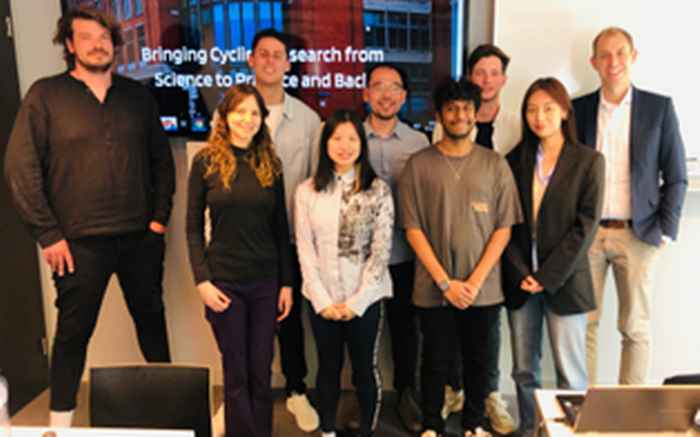ABS Students pitch expansion and commercialisation ideas to Urban Cycling Institute
31 May 2023

How can governments boost sustainable mobility in their cities? What if the Urban Cycling Institute (UCI) became the ultimate hub for cycling research and knowledge exchange? Is it possible for this academic research institute to evolve into a sustainable non-profit organisation? These questions were posed to students as part of a live case during their MSc BA elective ‘Globalisation and Offshoring,’ led by Dr Jan Schmitt.
The UCI is a non-profit organisation housed within the Humanities Venture Lab at the University of Amsterdam (UvA). The UCI’s primary goal is to turn academic research on urban cycling into solutions that help governments, planners, and citizens worldwide to embrace urban cycling. But how to tackle this broad vision is something the organisation is struggling with - so the UCI participated in a live case organised by the Amsterdam Living Case Lab (ALCL), an initiative that connects industry with education.
Live case challenge: expanding the influence of cycling research
The student groups each delved into different elements of the questions and presented unique approaches to Dr George Liu, Director of Learning at UCI. One group focused on growing the impact of urban cycling research to Dutch stakeholders and partners including bike manufacturers, government cycling initiatives such as Tour De Force, and urban planners. They also suggested ways to build a bigger community following from the organisation’s innovative and fun cycling YouTube videos.
The other team went global and suggested UCI capitalise on the Dutch cycling brand and go abroad to make an impact. Governments are trying to build more sustainable mobility solutions and cycling is key to that. The countries this team researched included France, Portugal, and the United Arab Emirates. They presented research and existing cycling initiatives, as well as proposed ways to commence talks with foreign urban planners and local governments.
Insightful ideas and solutions
This is the second year in which a live challenge was organised as part of the Globalisation and Offshoring elective. Lecturer Dr Schmitt: ‘It’s great to see students offering helpful and practical advice to Dutch scaleups as they look to expand. Having a mix of local and international students in the classroom adds creativity and depth to the solutions presented too.’ Dr Liu adds: ‘These solutions have been really insightful and there are many things we can do now thanks to the ideas from students.’
Live cases connecting industry and students
This initiative was facilitated by the Amsterdam Living Case Lab (ALCL). The ALCL connects companies with the courses and study programmes and collaborates with the lecturers to structure the innovation problems. The collaboration between the business school and the UCI was a great example of how campus innovative initiatives, such as the UCI, can have an impact on students’ learning experiences.